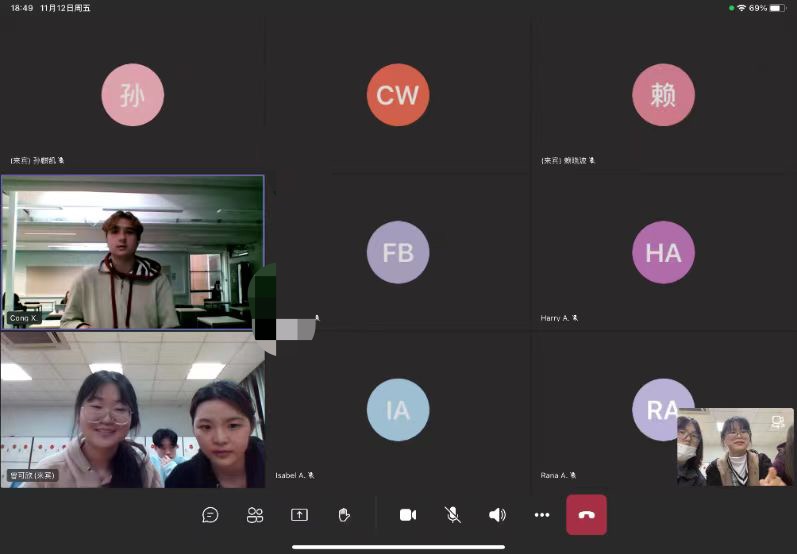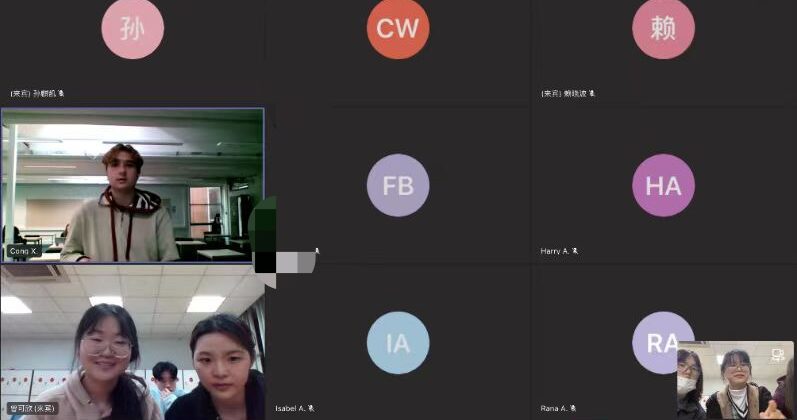By: Cong Xia Li, School of Literature and Languages, congxia.li@reading.ac.uk

Overview
This report details a Teaching and Learning-funded initiative aimed at advancing the linguistic and intercultural competence of intermediate-level Chinese and Japanese language learners (IWLP Stage 3) through Virtual Exchange (VE) projects. Virtual Exchange involves online collaborative educational approaches connecting learners from diverse cultural backgrounds. Our objectives include enhancing linguistic competence, fostering intercultural understanding, and evaluating/refining the VE initiatives. These objectives are explained in more detail below:
Objectives
- Enhance linguistic competence. Improve students’ language proficiency through collaborative language learning activities with native speakers.
- Foster intercultural understanding. Develop intercultural competence by connecting students with peers from diverse cultural backgrounds.
- Evaluate and refine VE initiatives. Conduct empirical research to assess the effectiveness of Chinese and Japanese VE projects, refining tasks, settings and assessments.
Context
The VE initiative was initially introduced in the academic year 2021-22, with Institution-Wide Language Program (IWLP) students of Chinese engaging in collaborative projects with peers from Nanjing University of Information Science and Technology (NUIST), which was well-received by both Reading and NUIST students. The students were from different modules (Chinese stage 3- LA1PC3 and Japanese Stage 3- LA1PJ3) . The Virtual Exchange sessions were run in separate classes by the Chinese and Japanese course convenors. While the current project focuses on the stage 3 students (post-beginners). Additionally, a new VE project for Japanese has been initiated with Miyazaki International College, Japan, for the Stage 3 Japanese class. The VE project, an optional activity in which approximately half of the IWLP Chinese 3 students and the Japanese 3 class took part in, served as a valuable complement to standard teaching. It not only assisted students in enhancing their speaking and writing skills but also facilitated the generation of additional information for the Stage 3 summative assessment, specifically the Stage 3 Cultural Comparison project.
Implementation
The VE project entails a six-week collaboration where students engage in both spoken and written activities. The topics, spanning music and art, youth issues, literature, and environmental concerns, were chosen collaboratively by the class teacher and their international counterparts. The activities primarily involved discussions—both verbal and written—between language learners and native speakers. These discussions focused on topics chosen by convenors to gather information for the Stage 3 project. This project comprises a written report and a group presentation, aiming to research and compare cultural differences between China/Japan and Britain. Participation in the VE project was voluntary, and those not taking part had to find the required information online.
For the pilot project, 12 Chinese and 8 Japanese students were involved, paired based on linguistic ability and shared interests. Initial meetings were facilitated through Zoom/Teams, after which IWLP Chinese learners organised individual paired sessions through WeChat. Participants completed pre- and post-project questionnaires, and a focus group of Chinese and Japanese students recruited from LA1PC3 and LA1PJ3 modules provided additional opinions and feedback.
Impact
The project’s objectives (enhance linguistic competence, foster intercultural competence, and evaluate and refine VE initiatives) were met:
Linguistic competence. Students were able to produce complicated sentence structures and more advanced vocabulary beyond the level accurately . For example, they were able to produce sentence that the first clause has an interrogative pronoun in their group presentation, like 无论有多大的胆子,中国学生通常都不会质疑老师的观点(Regardless of how bold they may be, Chinese students usually do not question the teacher’s viewpoints).
Intercultural competence. Intercultural competence was evident as students demonstrated the ability to discern between formal and informal behaviour and language use in various situations. One student from the focus group noted, ‘The language and manners employed during discussions with our Japanese partners were markedly distinct from what we learn in the classroom.’
Refine VE initiatives. Most of the students preferred to talk to the native speakers than have a formal language lesson. They reported that their partners were too eager to correct their grammar mistakes in formal lessons; rather, they would have preferred more open discussions of the topics. The VE initiative in Chinese is continuing this year. We have made several adjustments to the activities of the VE program. For example, the aim of the VE project is emphasised at the initial meeting, following feedback from the focus group.
Student testimonials underscored other positive receptions of the initiative, highlighting perceived improvements in various areas:
Enhanced language proficiency. Participants demonstrated heightened language skills, observable through assessments and student testimonials. Engagement in learning activities increased, with a notable enthusiasm in communication with native speakers. This was reflected not only in enhanced fluency and accuracy but also in the use of advanced vocabulary and sentence structures.
Cultural exchange. VE projects facilitated meaningful interactions that broadened students’ understanding of Chinese and Japanese culture beyond traditional classroom teachings. Through discussions with peers, students learned informal ways to interact in Chinese and Japanese, gained different perspectives on contemporary youth challenges in China and Japan, and developed a more in-depth understanding and analysis of cultural aspects in Chinese novels and literature.
Increased global awareness. Students developed a broader perspective on cultural diversity, with two focus group participants noting that the experience heightened their sensitivity to cultural differences, boosting their confidence to work or socialise in multicultural environments in the future.
Reflections
Overall, the designed and delivered VE projects in Chinese and Japanese met our objectives. Collaborations with native speakers provided invaluable opportunities for cultural exchange, benefiting both UK and international students. However, certain observations and reflections were made.
While both Chinese and Japanese learners expressed positive views on VE projects, compared with their Japanese counterparts, the Chinese learners found them less useful for developing linguistic and intercultural competence. In follow-up interviews, these students preferred physical collaboration on campus over virtual interaction.
For future studies, recommendations include employing different communication approaches for synchronous and asynchronous interactions, providing clear instructions for the VE program’s aims and expectations at the initial meeting, and finding ways to leverage the large international student body on campus to facilitate physical meetings with native speaker.
Follow up
The project was presented at an international conference in Poznan, Poland, in May 2023. VE projects with NUIST continue, and efforts are underway to establish collaborations with native speakers on campus. The positive outcomes and lessons learned form a foundation which approach can be expanded to other languages, benefiting a wider student population. The report encourages colleagues in other languages and disciplines to consider VE projects for international collaboration program. I am delighted to learn that a colleague at the Economics Department is exploring the VE approach with the students at NUIST who are enrolled in the 3+1 programme (a joint programme offered by NUIST Reading Academy and UoR that runs for 4 years).



